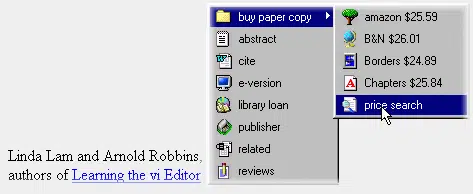Earlier this month, after returning from a backpacking vacation outwest, I searched for the right words to describe my feelings. One week I was wading in a glacial lake at 9,000 feet with snow capped peaks towering above me. The next week I was back in my cubicle with phones ringing from 3 directions.

Previous generations of writers turned the dictionary and thesaris, but
my generation has “google suggests“.
Google suggests is the dropdown box that appears in my browser as I type search terms. If I type “american”, google suggests:
- american idol
- american airlines
- american express
- american eagle ..
If I type “post vacation”, google suggests:
- post vacation depression
- post vacation blues
- post vacation rentals
Well, “depression” may be a little strong, but “blues”, yes.
Seriously, google suggests is not a replacement for the thesarus becaused it’s designed for search, not general use. But it could be. And it’s interesting to think about how technology that was originally designed for a specific purpose could turn into something larger.
Take google adwords. Google adwords was originally designed to display taylored ads in the right hand margin of search results. Mouse click-through rates are logged and totaled, allowing better-performing ads to be displayed more often and unclicked ads to be dropped from the rotation.
This sort of performance tracking is a revolution in the advertising business and is probably making inroads in the newspaper business as well.
Online Newspaper editors can track what stories are most read. They can also experiment with alternate headlines, if their software supports an adwords-type click analysis.
Of the first 100 people to view a New York Times article, the first 50 could be given one headline. The other 50 people would see an alternate headline. The system could track click-through rates and the winning headline would then be show to a majority of subsequent visitors.
I wonder whether an online publication is already doing this sort of thing. If they aren’t, I suspect some newspaper will start in the near future.
It’s been over a month and I’m over my “post vacation blues”, but I’m still intrigued by the idea of performance-tested writing. Does performance testing (or rather popularity-testing) really improve the quality of newspaper headlines? The collaborative news site Reddit would be a good place to test the concept.
Reddit currently gives article submissions a single title field, yielding submissions that range from self-help, to outrage, to overly verbose:
- “7 Secrets of the Super Organized”
- “Pit bull owner shoots man for trying to stop pit bull attack”
- ‘”IMPEACH CHENEY IF YOU WANT, but do bear in mind that he’ll preside over his own impeachment trial”‘
Actually its not so much just headlines, but the content too. Performance-tested headlines drive traffic, which drives story selection. But direct democracy isn’t always a good thing. Think of it as an “invasive species” that destroys an ecosystem if not properly balanced.
Newspaper editors and sites like Reddit will have to maintain standards or develop moderating systems to prevent the sensational, but popular, from taking over. Think of it as a “national park system” for writing




